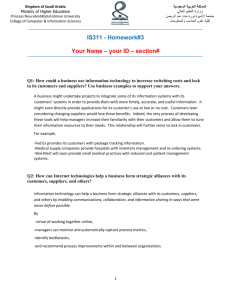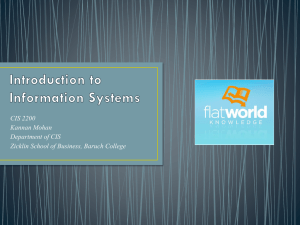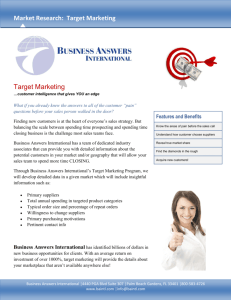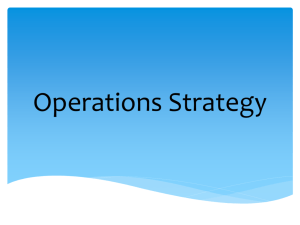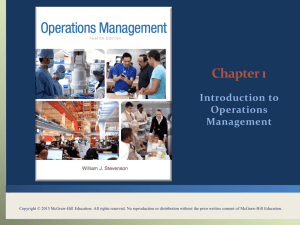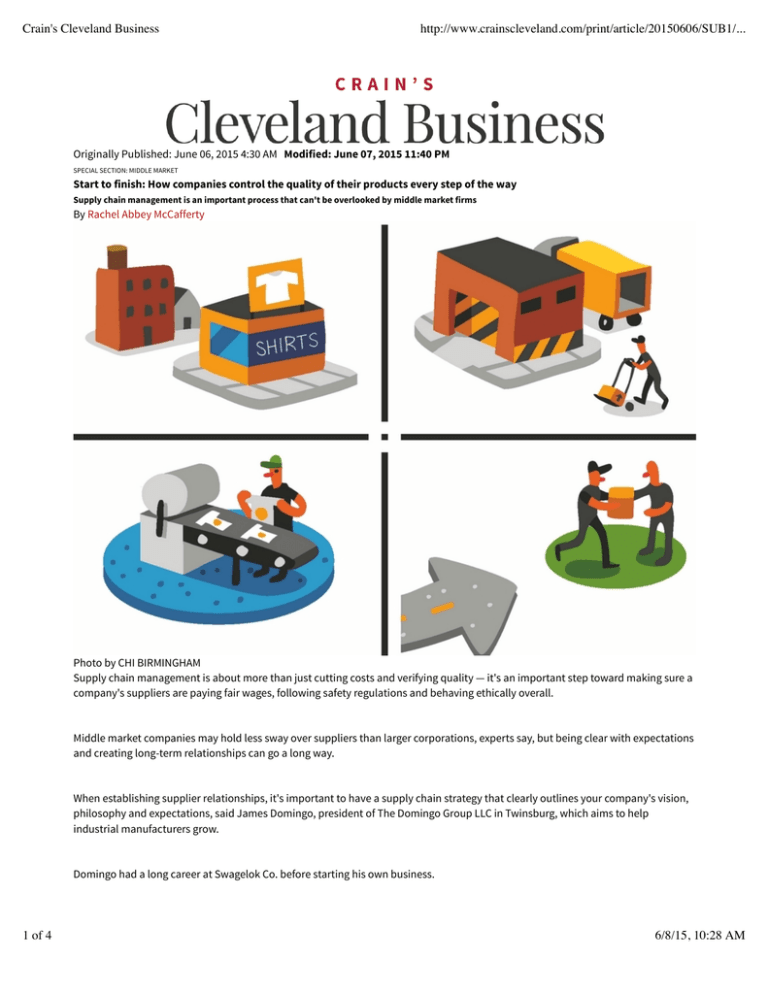
Crain's Cleveland Business
http://www.crainscleveland.com/print/article/20150606/SUB1/...
Originally Published: June 06, 2015 4:30 AM Modified: June 07, 2015 11:40 PM
SPECIAL SECTION: MIDDLE MARKET
Start to finish: How companies control the quality of their products every step of the way
Supply chain management is an important process that can't be overlooked by middle market firms
By Rachel Abbey McCafferty
Photo by CHI BIRMINGHAM
Supply chain management is about more than just cutting costs and verifying quality — it's an important step toward making sure a
company's suppliers are paying fair wages, following safety regulations and behaving ethically overall.
Middle market companies may hold less sway over suppliers than larger corporations, experts say, but being clear with expectations
and creating long-term relationships can go a long way.
When establishing supplier relationships, it's important to have a supply chain strategy that clearly outlines your company's vision,
philosophy and expectations, said James Domingo, president of The Domingo Group LLC in Twinsburg, which aims to help
industrial manufacturers grow.
Domingo had a long career at Swagelok Co. before starting his own business.
1 of 4
6/8/15, 10:28 AM
Crain's Cleveland Business
http://www.crainscleveland.com/print/article/20150606/SUB1/...
Price is an important factor when selecting a supplier, but “capabilities and reliability” are often even more critical, Domingo said.
Domingo suggests having a “checklist” of points on which to assess potential suppliers, including product quality, attention to
health and safety and approach to environmental issues.
By outlining your company's principles, it becomes clear who is and who is not a good fit. And, he said, it's important to have a way
to clearly communicate those standards to suppliers.
Companies can say that they'd like to see certain safety practices implemented at a business in order to use them as a supplier.
“With good conscience, we can demand and expect that of suppliers,” Domingo said.
A local example can be found at Great Lakes Cheese in Hiram, which did not respond to repeated requests for comment.
The company's supply chain was brought into question after evidence of animal cruelty surfaced at one of its suppliers in November
2014.
In March, the company updated its animal welfare policy. The policy clearly outlines expectations for suppliers, from requiring dairy
farm employees to sign an annual Employee Code of Ethics to asking suppliers to phase out tail docking by 2018 when possible.
“Willful mistreatment or cruelty to animals will not be tolerated,” the company said as part of its animal welfare policy on its
website.
“High quality dairy products begin with high quality milk from well-cared for and humanely-treated animals.”
Relationship building
Globalization has made it so companies have to really do their due diligence when selecting a supplier that aligns with the
behaviors they expect, said Oya Tukel, chair of the operations and supply chain management department at Cleveland State
University's Monte Ahuja College of Business.
“Lot of times, suppliers over-promise and under-deliver,” she said.
Creating long-term relationships with suppliers can help address that. Those types of suppliers understand their customers' beliefs
and can act accordingly, Tukel said.
Jakprints Inc. in Cleveland has a relationship-driven supply chain, said CEO Nick DeTomaso.
Suppliers have to align with the printer's strong ecological values, he said, which has led to the company using mostly domestically
sourced, responsibly forested paper for that part of its business.
2 of 4
6/8/15, 10:28 AM
Crain's Cleveland Business
http://www.crainscleveland.com/print/article/20150606/SUB1/...
The company's product development team reviews potential suppliers to make sure their business ethos matches Jakprints',
DeTomaso said.
But as a printer, Jakprints — which has grown from annual revenues of about $5.5 million in 2005 to $25 million last year — is also
familiar with being part of another company's supply chain.
Overall, communication is critical, DeTomaso said, especially when Jakprints becomes a larger part of another company's supply
chain. The company will fly employees out to the customer, even keeping a person on site if need be.
Relationships are especially important in what DeTomaso calls the company's virtual inventory fulfillment, which allows Jakprints
to print products by the order for entities like Viacom Inc. and Sony Music Entertainment, instead of keeping items stocked in a
physical warehouse.
DeTomaso said Jakprints separated the virtual inventory part of its business from its legacy business so that it could curate its
customers and choose those who work as true partners.
Size matters
Companies with ethical supply chains are those that not only trust their suppliers, but also make sure to verify that everything's
happening as planned, said Michael Graska, president and owner of supply chain and logistics company IGSCM Group LLC in
Brecksville. It's also important to make sure expectations on price, delivery and ethics are clear to suppliers, a necessity that may be
easier for smaller companies with fewer suppliers.
“As you grow larger, as you expand, as you go from small to medium, you sometimes have a harder time being clear with your
expectations,” Graska said.
Middle market companies face the same supply chain challenges as larger ones, but they have less leverage than a corporation the
size of Apple Inc., said Mahesh Srinivasan, associate professor and program coordinator for supply chain at the University of Akron.
If a smaller company goes to one of its suppliers and asks them to pay employees fair wages, suppliers may not have reason to
listen, he said.
Ultimately, Srinivasan said, the driving force behind corporate social responsibility practices is customer demands.
Srinivasan has been studying such practices, looking at factors such as whether members of a supply chain are following laws or
paying fair wages.
And while there are companies that truly care about the issues, these practices can hurt competitiveness, he said, driving up prices
and tightening margins.
Working to make sure suppliers are acting ethically isn't a new concern for companies, but as supply chains have become
increasingly global, companies have to address new cultural and logistical issues, said Steve Ash, professor and chair of the
department of management at the University of Akron. Smaller companies may have to even rely on intermediaries to manage
those relationships.
3 of 4
6/8/15, 10:28 AM
Crain's Cleveland Business
http://www.crainscleveland.com/print/article/20150606/SUB1/...
“That distance creates a lot of different barriers,” Ash said.
Use of editorial content without permission is strictly prohibited. All rights Reserved 2015 www.crainscleveland.com
4 of 4
6/8/15, 10:28 AM


